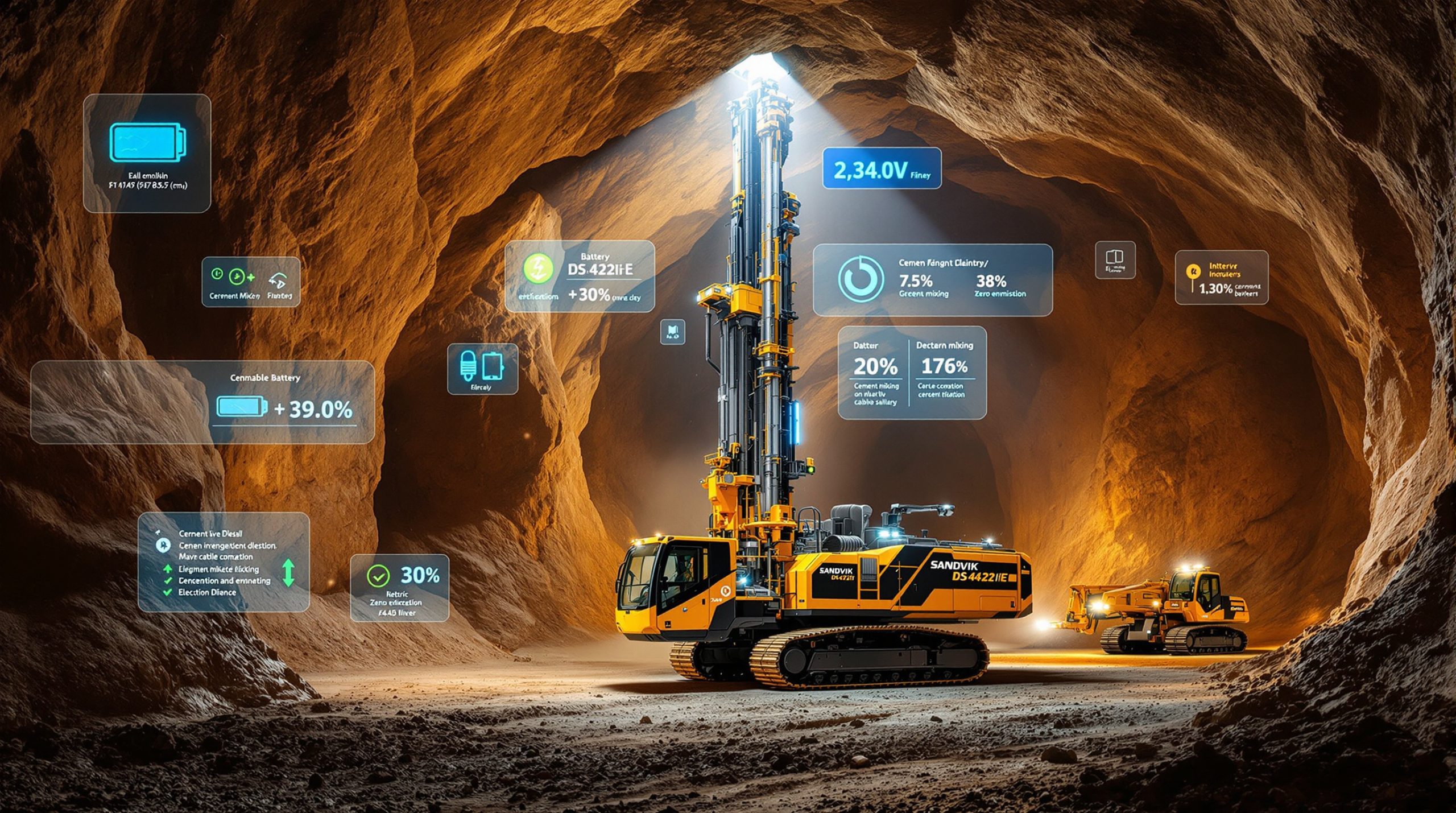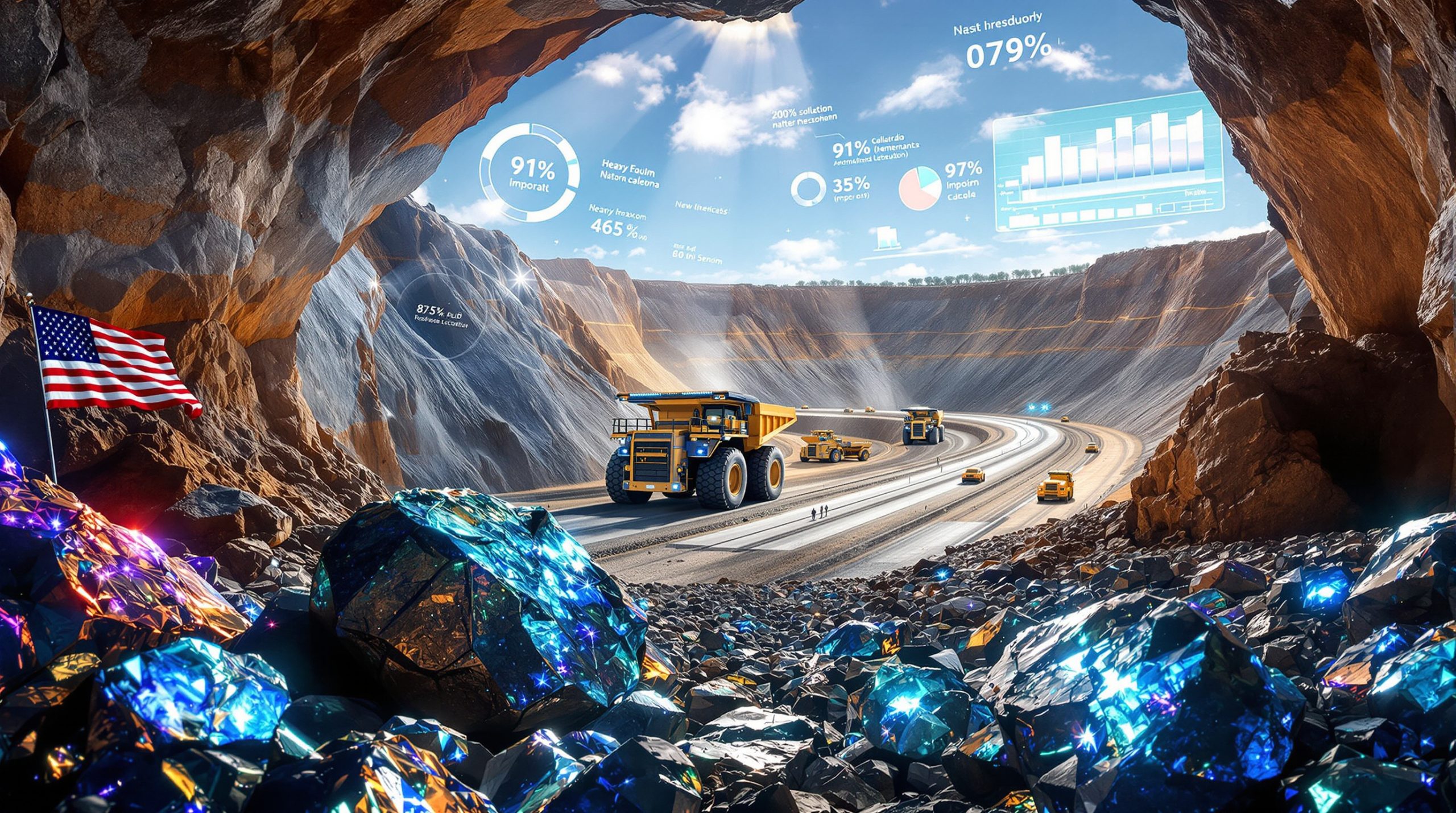Why Are Mining Jobs Well-Compensated?
The mining industry offers some of the highest-paying career opportunities across the global job market, with compensation packages reflecting the unique demands and specialized skills required. Several key factors contribute to the premium salaries found throughout the sector.
Mining operations frequently take place in challenging environments that present significant physical risks and hazards. Workers often face extreme temperatures, confined spaces, and exposure to potentially dangerous materials. These high-risk conditions necessitate extensive safety protocols and expertise, which commands higher compensation.
Remote locations represent another significant factor driving mining salaries upward. Many operations are situated in isolated regions far from population centers, requiring professionals to work on rotation schedules or relocate to remote communities. Companies typically offer substantial hardship allowances and travel incentives, sometimes increasing base salaries by 15-30% to attract qualified talent to these locations.
Technical complexity in modern mining operations demands advanced education and specialized training. Today's mines utilize sophisticated technologies including automation, remote sensing, and complex extraction processes that require extensive technical knowledge to operate efficiently and safely. The ongoing digital transformation in mining has created new roles and increased the value of professionals who can bridge traditional mining expertise with technological innovation.
The inherent profitability of the sector enables mining companies to offer competitive compensation packages. With global mineral demand continuing to grow, particularly for critical minerals essential to renewable energy technologies, companies maintain healthy margins that support premium salaries for skilled professionals.
The global competition for qualified mining professionals has intensified in recent years, particularly for specialized roles in engineering, geology, and senior management. This international demand creates a seller's market for talent, enabling professionals to command higher salaries across borders.
How Education and Experience Impact Mining Salaries
Educational qualifications serve as the foundation for career advancement in mining, with most high-paying positions requiring specific degrees and certifications. Bachelor's degrees in engineering disciplines, geosciences, or related fields represent the minimum requirement for technical roles, while advanced positions typically demand postgraduate qualifications and professional certifications.
Industry experience significantly influences earning potential, with senior roles generally requiring 10+ years of progressive responsibility. For example, the journey from Junior Mining Engineer to Project Director typically involves at least a decade of demonstrated expertise and leadership capability.
Technical specialization in high-demand areas—such as automation, environmental management, or critical minerals processing—can accelerate salary growth by 15-25% compared to more general roles. Companies are increasingly willing to pay premium rates for professionals with expertise in emerging technological applications that improve efficiency and safety.
What Are the Top 10 Highest Paying Jobs in the Mining Industry?
10. Environmental Manager/Specialist
Salary Range: $80,000-$130,000 annually
Environmental management has become a critical function within mining operations as regulatory requirements intensify and social license to operate grows increasingly dependent on environmental performance. Environmental Managers develop and implement comprehensive sustainability frameworks that balance operational needs with environmental protection.
These specialists conduct thorough environmental impact assessments before mining begins and develop site rehabilitation plans to restore landscapes after extraction concludes. Their responsibilities include continuous monitoring of air and water quality, waste management, and biodiversity protection throughout the mine lifecycle.
Environmental professionals in mining must ensure operations comply with increasingly complex regulations across multiple jurisdictions. They frequently serve as the primary liaison between mining companies and environmental regulatory agencies, preparing detailed compliance reports and securing necessary permits. Their work is becoming increasingly vital as ESG in mining takes center stage in corporate strategies.
Educational Requirements:
- Bachelor's degree in Environmental Science, Environmental Engineering, or related field (4 years)
- Master's degree often preferred for senior positions (additional 2 years)
- Specialized certifications in environmental management systems (ISO 14001)
Highest Demand Regions: Canada's oil sands region, Australia's mining hubs, Scandinavian countries (particularly Finland), South Africa, and Brazil's mineral-rich regions.
9. Mine Surveyor
Salary Range: $80,000-$130,000 annually
Mine Surveyors provide essential spatial measurement expertise that guides the precision and safety of mining operations. Using sophisticated technologies like laser scanning, GPS, and drone-based photogrammetry, these professionals create detailed three-dimensional maps and models that inform extraction strategy.
Their work includes tracking ore body dimensions, monitoring ground movement and stability in both surface and underground mines, and calculating precise volumes of material extracted. This data directly impacts production reporting, resource management, and financial forecasting.
Mine Surveyors also ensure legal compliance by accurately delineating property boundaries and mining claims, preventing costly disputes with neighboring operations. Their measurements help engineers design safe, efficient underground passages and optimal blast patterns.
Educational Requirements:
- Bachelor's degree in Surveying, Geomatics, or Mining Engineering (3-4 years)
- Professional surveyor licensing, which varies by jurisdiction
- Specialized training in mining-specific surveying techniques and software
Highest Demand Regions: Australia's iron ore operations, Canada's mineral-rich territories, Ghana's gold mining districts, Chile's copper mines, and South Africa's diverse mining sector.
8. Mechanical/Electrical Engineer (Mining Equipment Focus)
Salary Range: $85,000-$140,000 annually
Specialized engineers focused on mining equipment ensure the reliability and efficiency of the complex machinery that forms the backbone of modern mining operations. These professionals design, maintain, and optimize equipment ranging from massive haul trucks and excavators to sophisticated underground mining systems.
Mechanical and electrical engineers in mining develop customized equipment solutions to address the unique challenges of specific mine sites, including extreme temperatures, high dust environments, and corrosive conditions. They implement preventative maintenance programs that minimize costly downtime while maximizing equipment lifespan.
With the increasing implementation of automation and remote operation technologies, these engineers play a crucial role in integrating new systems with existing infrastructure. Their expertise directly impacts operational efficiency, with skilled engineers potentially saving operations millions in maintenance costs annually.
Educational Requirements:
- Bachelor's degree in Mechanical or Electrical Engineering (4 years)
- Professional engineering license often required after 4-5 years of practice
- Specialized training in mining equipment applications and automation systems
Highest Demand Regions: USA's heavy equipment manufacturing hubs, Australia's remote operations, South Africa's deep mining operations, Indonesia's expanding mining sector, and Russia's resource-rich regions.
7. Health and Safety Manager
Salary Range: $90,000-$150,000 annually
Health and Safety Managers in mining hold one of the industry's most critical roles, responsible for protecting workers in environments with significant inherent risks. These professionals develop comprehensive safety systems that address both common hazards and site-specific dangers.
Their duties include implementing rigorous safety training programs, conducting regular inspections and audits, and investigating incidents to prevent recurrence. Modern safety managers increasingly employ data analytics to identify patterns and predict potential issues before they occur.
Beyond compliance with regulatory requirements, today's mining safety professionals focus on creating a positive safety culture throughout operations. Their effectiveness directly impacts both human welfare and company performance, as safety incidents can result in production delays, regulatory penalties, and reputation damage.
Educational Requirements:
- Degree in Occupational Health and Safety, Safety Engineering, or related field (3-4 years)
- Industry certifications such as NEBOSH International Diploma or ISO 45001 implementation
- Continuous professional development to stay current with emerging safety practices
Highest Demand Regions: Australia's mining operations with zero-harm targets, Canada's strict regulatory environment, South Africa's deep mining operations, United States' diverse mining sector, and Peru's expanding operations.
6. Drill and Blast Engineer
Salary Range: $90,000-$160,000 annually
Drill and Blast Engineers combine technical expertise with precise calculations to fragment rock efficiently while maintaining safety and minimizing environmental impact. Their work forms the critical first step in the extraction process, determining the quality of material available for processing.
These specialists design drilling patterns and explosive configurations customized to specific geological conditions. They calculate precise explosive quantities and timing sequences to achieve optimal fragmentation while controlling vibration and fly rock that could damage equipment or structures.
Environmental considerations represent an increasingly important aspect of their role, with modern Drill and Blast Engineers employing techniques to reduce dust, noise, and ground vibration affecting surrounding communities. Their expertise directly impacts downstream processing efficiency and overall project economics.
Educational Requirements:
- Bachelor's degree in Mining Engineering, Civil Engineering, or related field (4 years)
- Specialized certifications in explosives handling and blast design
- Extensive practical training and mentorship under experienced blasting professionals
Highest Demand Regions: Australia's iron ore and coal operations, Indonesia's expanding mining sector, Canada's northern territories, South Africa's diverse mining operations, and United States' quarrying and metal mining regions.
5. Metallurgist/Mineral Processing Engineer
Salary Range: $80,000-$140,000 annually
Metallurgists and Mineral Processing Engineers transform raw ore into valuable mineral products through complex physical and chemical processes. Their expertise determines how efficiently a mine can extract and process valuable materials from the surrounding waste rock.
These specialists design circuits incorporating crushing, grinding, flotation, leaching, and other separation techniques tailored to specific ore characteristics. They continuously optimize these processes to maximize metal recovery while minimizing energy consumption and reagent costs.
Metallurgists address complex processing challenges such as refractory ores, mixed mineral deposits, and environmentally sensitive materials. Their innovations can significantly impact project economics by increasing recoverable metal from the same ore body or reducing processing costs.
Educational Requirements:
- Bachelor's degree in Metallurgical Engineering, Chemical Engineering, or Mineral Processing (4 years)
- Advanced degrees often preferred for research and development positions
- Specialized training in specific mineral processing techniques and laboratory procedures
Highest Demand Regions: South Africa's complex ore bodies, Australia's diverse mining operations, Russia's metallurgical complexes, Chile's copper industry, and Mongolia's developing mining sector.
4. Geologist/Exploration Geologist
Salary Range: $85,000-$150,000 annually
Geologists serve as the foundation of successful mining ventures by identifying and evaluating mineral deposits worth billions in potential value. Exploration Geologists combine scientific knowledge with investigative skills to discover new resources that sustain the industry's future.
These earth scientists analyze geological formations, interpret geophysical and geochemical data, and develop detailed three-dimensional models of subsurface mineral deposits. Their work guides strategic decisions about where companies should invest exploration and development capital.
Resource estimation represents a particularly critical aspect of the geologist's role, providing the foundation for mining feasibility insights and financial projections. The accuracy of their models directly influences project feasibility and long-term mine success.
Educational Requirements:
- Bachelor's degree in Geology, Earth Sciences, or Geological Engineering (4 years)
- Master's degree often required for senior positions and specialized roles
- Professional geologist certification or registration in many jurisdictions
Highest Demand Regions: Canada's mineral exploration hubs, Australia's diverse mining territories, Chile's copper industry, Mexico's precious metals sector, and Ghana's gold mining regions.
3. Mining Engineer
Salary Range: $90,000-$160,000 annually
Mining Engineers design and oversee the physical systems that safely and efficiently extract minerals from the earth. They develop comprehensive plans that balance technical, economic, safety, and environmental considerations throughout the mining lifecycle.
These engineers determine the optimal mining method—surface, underground, or solution mining—based on deposit characteristics and economic factors. They design critical infrastructure including mine layouts, ventilation systems, ground support, and water management systems that ensure safe operations.
Production optimization represents a core responsibility, with Mining Engineers continuously seeking improvements in extraction efficiency and cost reduction. They frequently collaborate with geologists, metallurgists, and environmental specialists to integrate technical aspects of mining operations.
Educational Requirements:
- Bachelor's degree in Mining Engineering or related field (4 years)
- Professional engineering license typically required after 4-5 years of practice
- Continuous technical training as mining methods and technologies evolve
Highest Demand Regions: Australia's diverse mining industry, Canada's expanding operations, United States' metal mining sector, Kazakhstan's developing resources, and Brazil's iron ore mines.
2. Mine Manager/Site Manager
Salary Range: $120,000-$200,000+ annually
Mine Managers oversee all aspects of daily operations at mining sites, balancing production targets with safety, environmental compliance, and financial performance. These leaders typically manage teams ranging from dozens to hundreds of employees across multiple departments.
Their responsibilities include translating strategic objectives into operational plans, managing production schedules, and ensuring efficient resource utilization. Mine Managers must maintain rigorous safety standards while meeting production targets—objectives that sometimes create competing priorities requiring careful balance.
Financial management represents a significant aspect of the role, with Mine Managers controlling multimillion-dollar operational budgets and making decisions that directly impact profitability. They also serve as the primary interface with regulatory agencies, community stakeholders, and corporate leadership.
Educational Requirements:
- Bachelor's degree in Mining Engineering or related field (4 years)
- 5-10 years of progressive mining experience in supervisory roles
- Advanced management training and specialized certifications
- MBA increasingly valued for senior management positions
Highest Demand Regions: Australia's remote operations, Peru's expanding mining sector, Zambia's copper belt, South Africa's diverse mining industry, and Canada's northern territories.
1. Project Director/General Manager
Salary Range: $150,000-$250,000+ annually
At the pinnacle of mining careers, Project Directors and General Managers provide strategic leadership for entire mining operations, overseeing all aspects from exploration through production and eventual closure. These executives manage operations worth hundreds of millions or billions of dollars.
Their comprehensive responsibilities include establishing long-term strategic direction, securing capital investment, and ensuring operations meet financial targets while maintaining safety and sustainability standards. They make critical decisions about expansion, technology implementation, and market positioning.
Stakeholder management represents an increasingly important aspect of this role, with Project Directors building relationships with government officials, community leaders, environmental groups, and investors. Their diplomatic skills often prove as valuable as their technical expertise.
Educational Requirements:
- Bachelor's degree in Mining Engineering, Geology, or related field (4 years)
- MBA or similar advanced degree highly valued (additional 2 years)
- 10-15+ years of progressive mining industry experience
- Executive leadership training and demonstrated success in senior roles
Highest Demand Regions: Australia's major mining corporations, Canada's resource development companies, South Africa's mining conglomerates, Chile's copper industry, and United States' diversified mining operations.
How to Advance Your Mining Career?
Essential Skills for High-Paying Mining Positions
Beyond technical qualifications, several key capabilities significantly influence career advancement in the mining sector. Leadership skills consistently rank as the most valuable career accelerator, with professionals who can effectively manage diverse teams across technical disciplines and cultural backgrounds commanding premium salaries.
Problem-solving abilities prove particularly valuable in mining's dynamic environments, where professionals must address complex operational challenges under time and resource constraints. Engineers and managers who develop innovative solutions to improve safety, efficiency, or environmental performance often receive faster promotions and performance bonuses.
Communication capabilities have grown increasingly important as mining operations involve more stakeholders. Professionals who can effectively translate technical information for different audiences—from local communities to corporate boards—advance more rapidly into senior positions with corresponding compensation increases.
Adaptability to technological change has become essential as the industry undergoes digital transformation. Mining professionals comfortable with emerging technologies like digital twins in mining and AI-powered analytics typically earn 10-15% more than peers with similar experience but limited technology exposure.
Risk management expertise combines technical knowledge with strategic thinking to balance operational requirements against safety, environmental, and financial considerations. This increasingly valued skillset commands higher compensation as companies face growing scrutiny of their risk management practices.
Geographic Considerations for Mining Professionals
The global nature of mining creates diverse opportunities for professionals willing to work internationally. Countries with robust mining sectors typically offer compensation packages reflecting local economic conditions, project scales, and talent availability.
| Country | Key Mining Sectors | Salary Premium | Special Considerations |
|---|---|---|---|
| Australia | Iron ore, coal, gold | 15-30% above average | Remote site allowances, favorable tax arrangements for FIFO workers |
| Canada | Gold, uranium, potash | 10-25% above average | Northern allowances, multicultural work environments |
| Chile | Copper, lithium | 10-20% above average | High-altitude operations, strong demand for processing specialists |
| South Africa | Gold, platinum, diamonds | Variable by position | Deep mining expertise highly valued, transformation policies |
| United States | Coal, gold, copper | 5-15% above average | Strong regulatory focus, growing technology implementation |
International experience significantly enhances career prospects, with mining executives frequently citing global assignments as critical to their advancement. Professionals with experience across multiple mining jurisdictions often earn 15-25% more than those who remain in a single country throughout their careers.
Emerging Trends Affecting Mining Salaries
Several industry developments are reshaping compensation structures and creating new high-value specializations within mining. Automation and digitalization are generating premium demand for professionals who combine traditional mining knowledge with technology expertise. Engineers with experience implementing autonomous systems can command 20-30% salary premiums in competitive markets.
ESG (Environmental, Social, Governance) priorities continue gaining importance, increasing the value of sustainability specialists. Environmental Managers with expertise in decarbonisation in mining and community relations professionals skilled in stakeholder engagement frequently receive offers 15-20% above standard industry rates.
The global transition to renewable energy technologies has accelerated critical minerals demand, driving growth in lithium, cobalt, rare earths, and copper mining. This trend creates salary premiums
Curious About Investing in the Next Major Mineral Discovery?
Stay ahead of the market with Discovery Alert's proprietary Discovery IQ model, which delivers instant notifications on significant ASX mineral discoveries and transforms complex mineral data into actionable investment insights. Understand why major mineral discoveries can lead to exceptional returns by exploring Discovery Alert's dedicated discoveries page and start your 30-day free trial today.




